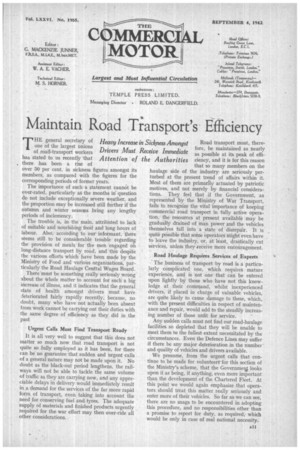Maintain Road Tianspores gfficiency
Page 13

If you've noticed an error in this article please click here to report it so we can fix it.
THE general secretary of one of the largest unions of road-transport workers has stated to us recently that there has been a rise of over 50 per cent, in sickness figures amongst its members, as compared with the figures for the corresponding periods of former years. The importance of such a statement cannot be over-rated, particularly as the months in question do not include exceptionally severe weather, and the proportion may be increased still further if the autumn and winter seasons bring any lengthy periods of inclemency.
The trouble is, in the main, attributed to lack of suitable and nourishing food and long hours of labour. Also, acccirding to our informant, there seems still to be considerable trouble regarding the provision of meals for the men engaged on long-distance transport by road, and this despite the various efforts which have been made by the Ministry of Food and various organizations, particularly the Road Haulage Central Wages Board.
There "must be something really seriously wrong about the whole matter to account for such a big increase of illness, and it indicates that the general state of health amongst drivers must have deteriorated fairly rapidly recently, because, no doubt, many who have not actually been absent from work cannot be carrying out their duties with the same degree of efficiency as they did in the past • Urgent Calls Must Find Transport Ready It is all very well to suggest that this does not matter so much now that road transport is not quite so fully employed as it has been, for there can be no guarantee that sudden and urgent calls of a general nature may not be made upon it. No doubt as the black-out period lengthens, the railways will not be able to tackle the same volume of traffic as they are carrying now, and any appreciable delays in delivery would immediately result in a demand for the services of the far more rapid form of transport, even taking into account the need for conserving fuel and tyres. The adequate supply of materials and finished products urgently required for the war effort may then over-ride all other considerations. Road transport must, therefore, be maintained as nearly as possible at its peak of efficiency, and it is for this reason that so many members on the haulage side of the industry are seriously perturbed at the present trend of affairs within it. Most of them are primarily actuated by patriotic motives, and not merely by financial considerations. They feel that if the Government, as represented by the Ministry of War Transport, fails to recognize the vital importance of keeping commercial road transport in fully active operation, the resources at present available may be gradually drained of man power and the vehicles themselves fall into a state of disrepair. It is quite possible that some operators might even have to leave the induStry, or, at least, drastically cut services, unless they receive more encouragement.
. Road Haulage Requires Services of Experts The business of transport by mad is a particularly complicated one, which requires mature• experience, and is not one that can be entered upon lightly by those who have not this knowledge at their command, whilst inexperienced drivers, if placed in charge of valuable vehicles, are quite likely to cause damage to these, which, with the present difficulties in respect of maintenance and repair, would add to the steadily increasing number of those unfit for service.
Any sudden calls must not find our road-haulage facilities so depleted that they will be unable to meet them to the fullest extent necessitated by the circumstances. Even the Defence Lines may suffer if there be any major deterioration in the number and quality of vehicles and drivers available.
We presume, from the urgent calls that continue to be made for volunteers for this section of the Ministry's scheme, that the Government looks upon it as being, if anything, even more important than the development of the Chartered Fleet. At this point we would again emphasize that operators should treat this matter really seriously and enter more of their vehicles. So far as we can see, there are no snags to be encountered in adopting this procedure, and no responsibilities other than a promise to report for duty, as required; which would be only in case of real national necessity.




















































